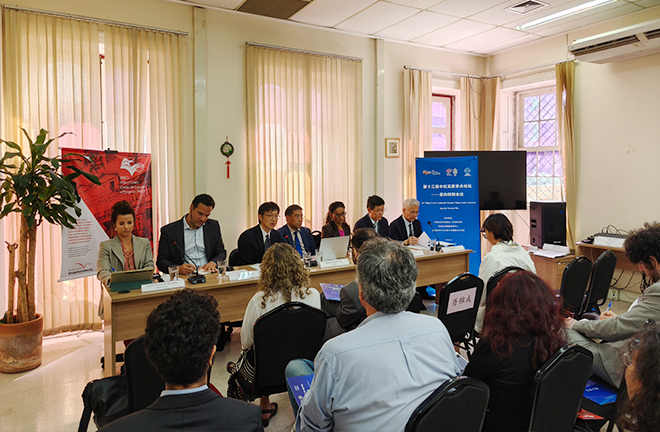High-level academic forum China-Latin America held in Rio

A scene of the forum Photo: Yang Xue/CSST
RIO DE JANEIRO—On Oct. 15, the 13th High-Level Academic Forum China-Latin America was held in Rio de Janeiro, Brazil. Scholars conducted in-depth discussions on China-Brazil relations, the Global South and global governance, and other topics.
Gao Xiang, president of the Chinese Academy of Social Sciences (CASS), noted in his speech at the opening ceremony that this year marks the 75th anniversary of the founding of the PRC and the 50th anniversary of the establishment of diplomatic relations between China and Brazil. Next month, the 19th G20 Leaders’ Summit will take place in Rio de Janeiro, placing Brazil in the global spotlight. At this pivotal moment, the move to focus on China-Brazil ties, unlock the potential of bilateral cooperation, and build academic consensus by holding the 13th High-Level Academic Forum China-Latin America Special Session is of particular significance.
Gao pointed out that at present, momentous changes of a like not seen in a century are accelerating globally, as the world has entered a new period of turbulence and transformation. In the face of common threats such as unilateralism, protectionism, and hegemonism, as well as common challenges like climate change, energy transformation, and cyber security, China and Brazil, as the largest developing nations in the eastern and western hemispheres, respectively, and important members of the Global South, share common interests and concerns.
In recent years, under the guidance of Xi Jinping Thought on Diplomacy, China has upheld the banners of peace, development, cooperation, and mutual benefits to deepen strategic mutual trust and expand strategic cooperation with Brazil, aligning the Belt and Road Initiative with Brazil’s mid- and long-term development strategies such as “Reindustrialization” and the “Growth Acceleration Plan,” Gao said. As a result, China-Brazil cooperation has grown more comprehensive, deeper, more balanced, and more sustainable, setting an example for solidarity and cooperation among Global South countries.
Isabel Siqueira, a professor and director of the Institute of International Relations at the Pontifical Catholic University of Rio de Janeiro (PUC-Rio), said that high-level academic dialogue grounded in academic research has infused strategic thinking into China-Brazil cooperation, offering inspiration for the formulation and implementation of public policy in the future. At the historic moment of the 50th anniversary of China-Brazil diplomatic ties, academia on both sides are poised to engage in further exchanges and collaborations, to contribute insights that will help both nations achieve sustainable development, eliminate global inequalities, and attain other common goals.
China and Brazil, both major developing countries with international and regional influence, are capable of maintaining stability and reducing dependence on the external environment when coping with economic fluctuations, thereby mitigating their vulnerabilities to some extent, said Chai Yu, director of the Institute of Latin American Studies (ILAS) at CASS. These common traits serve as “anchors” for future China-Brazil cooperation.
Maria Elena Rodriguez, a professor and adjunct director of the BRICS Policy Center, said that as major countries, China and Brazil shoulder the responsibility of tackling common challenges facing the Global South. She underscored the need for China-Brazil cooperation to set new agendas and diversify cooperative models, while facilitating the stable development of bilateral relations with a longer-term strategic vision, working together to advance global governance.
The forum was jointly held by the ILAS, the BRICS Policy Center, and the Institute of International Relations at the PUC-Rio.
Edited by CHEN MIRONG
